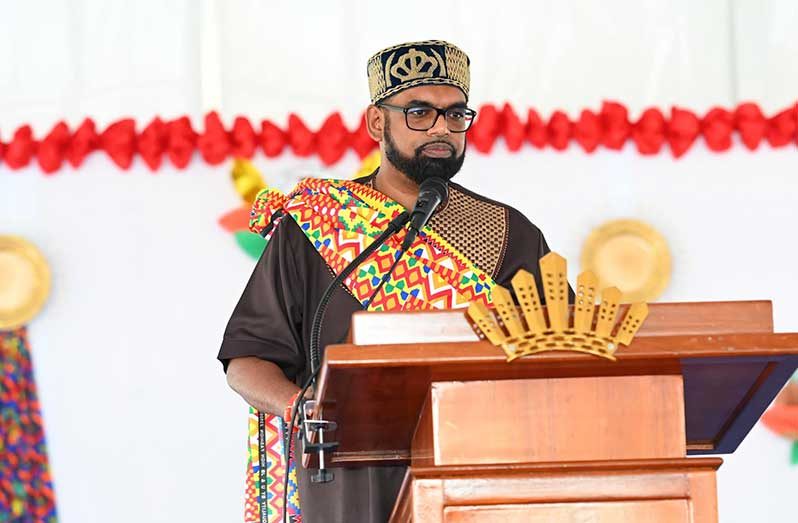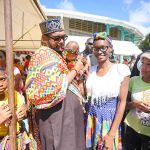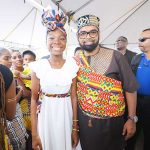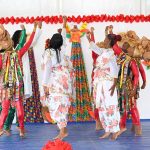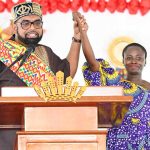–President Ali says at New Amsterdam Emancipation celebrations
–underscores CARICOM’s commitment to fighting for reparation; announces establishment of country’s first National Cultural Market in Region Six
PRESIDENT, Dr. Irfaan Ali delivered a powerful tribute to the enduring legacy of those who fought for freedom and a call to continue their fight for equality.
He was a special guest at the 186th emancipation celebration on Thursday, held at the New Amsterdam Technical Institute’s tarmac in Region Six (East Berbice-Corentyne).
In his address, President Ali emphasised that the fight for freedom was not just a battle for the liberation of a single group of people but for all of humanity.
“We are free to love each other. We are free to uplift each other. We are free to celebrate each other. We are free as Guyanese and nothing will stop us from being free,” he proclaimed.
The Head of State challenged everyone gathered to do everything within their power to guarantee that freedom endures, considering the enduring effects of the transatlantic slave trade.
President Ali stated that slavery was the harshest form of human indignity. But he also pointed out that the ancestors’ perseverance and sacrifices have paid off. In this context, he emphasised the significance of maintaining Afro-Guyanese heritage, describing it as important.
“Our ancestors did not fight for the freedom of themselves. They did not fight for the freedom of one group of people. They did not fight for the freedom of one set of people. They fought for the freedom of all of humanity. And if we do an injustice to that struggle for freedom by trying to separate or trying to not love each other, we are doing an injustice and we are not celebrating fulsome what that struggle for freedom was,” he said to enthusiastic applause from the crowd.
President Ali announced that efforts are underway to establish Guyana’s first National Cultural Market in Palmyra, Region Six, citing the region’s unique cultural makeup as justification.
He said: “This will be a recognition of the importance of culture in the evolution of every society. This will be a symbol of the importance of culture in bridging the gap and bringing people together.”
In addition to these, he said that the National Cultural Market must represent: “… the importance of culture in economic and social revolution… the importance of culture in developing healthy lifestyles… the importance of culture in fusing the moral fabric of our society…
“It must represent a single place through which the entirety of our culture can be understood. It must be a place of cultural education. It must be a place of showcasing of talents. It must be a place in which families and our children can feel free and safe. It must be a place that nurtures the future of our country. It must be a place that embolden us to think, act and behave in a different way.” He said that the National Cultural Market will be completed very soon.
CONTINUE FIGHT FOR REPARATION
It is critical to keep in mind “that the liberation of our ancestors was not merely the end of their bondage but part of a continuing journey towards greater dignity,” the Guyanese leader said to the assembly.
He emphasised that those who instigated, condoned and profited from slavery are yet to fully acknowledge their debt to those who were oppressed.
Apologies are good, but President Ali said that the Caribbean Community (CARICOM) would continue to press “until we get full reparation for our people.”
He said that CARICOM will not give up the “struggle” for reparation, adding that seeking this entails more than simply paying money; it also entails acknowledging wrongs done and finding closure.
“Reparation represents a step towards rectifying the wrongs and building a more just and equitable future,” the President stressed.
The event featured a rich array of cultural activities, including dancing, and drumming that showcased the heritage and achievements of the African Guyanese community. Traditional foods such as cook-up rice, metemgee, and fufu were on offer, providing attendees with a taste of authentic African Guyanese cuisine.




.jpg)


